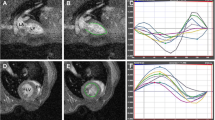Abstract
Accurate and efficient quantification of cardiac motion offers promising biomarkers for non-invasive diagnosis and prognosis of structural heart diseases. Cine cardiac magnetic resonance imaging remains one of the most advanced imaging tools to provide image acquisitions needed to assess and quantify in-vivo heart kinematics. The majority of cardiac motion studies are focused on human data, and there remains a need to develop and implement an image-registration pipeline to quantify full three-dimensional (3D) cardiac motion in mice where ideal image acquisition is challenged by the subject size and heart rate and the possibility of traditional tagged imaging is hampered. In this study, we used diffeomorphic image registration to estimate strains in the left ventricular wall in two wild-type mice and one diabetic mouse. Our pipeline resulted in a continuous and fully 3D strain map over one cardiac cycle. The estimation of 3D regional and transmural variations of strains is a critical step towards identifying mechanistic biomarkers for improved diagnosis and phenotyping of structural left heart diseases including heart failure with reduced or preserved ejection fraction.
Access this chapter
Tax calculation will be finalised at checkout
Purchases are for personal use only
Similar content being viewed by others
References
Abhayaratna, W.P., Marwick, T.H., Smith, W.T., Becker, N.G.: Characteristics of left ventricular diastolic dysfunction in the community: an echocardiographic survey. Heart 92(9), 1259–1264 (2006)
Amzulescu, M.S., et al.: Myocardial strain imaging: review of general principles, validation, and sources of discrepancies. Eur. Heart J. Cardiovascular Imaging 20(6), 605–619 (2019)
Benjamin, E.J., et al.: Heart disease and stroke statistics–2019 update: a report from the American heart association. Circulation 139(10), e56–e528 (2019)
Bistoquet, A., Oshinski, J., Škrinjar, O.: Myocardial deformation recovery from cine MRI using a nearly incompressible biventricular model. Med. Image Anal. 12(1), 69–85 (2008)
Coleman, D.L.: Obese and diabetes: two mutant genes causing diabetes-obesity syndromes in mice. Diabetologia 14(3), 141–148 (1978)
De Craene, M., et al.: 3d strain assessment in ultrasound (straus): a synthetic comparison of five tracking methodologies. IEEE Trans. Med. Imaging 32(9), 1632–1646 (2013)
Garot, J., et al.: Fast determination of regional myocardial strain fields from tagged cardiac images using harmonic phase MRI. Circulation 101(9), 981–988 (2000)
Geyer, H., et al.: Assessment of myocardial mechanics using speckle tracking echocardiography: fundamentals and clinical applications. J. Am. Soc. Echocardiogr. 23(4), 351–369 (2010)
Konstam, M.A., Abboud, F.M.: Ejection fraction: misunderstood and overrated (changing the paradigm in categorizing heart failure). Circulation 135(8), 717–719 (2017)
Lima, J.A., et al.: Accurate systolic wall thickening by nuclear magnetic resonance imaging with tissue tagging: correlation with sonomicrometers in normal and ischemic myocardium. J. Am. Coll. Cardiol. 21(7), 1741–1751 (1993)
Mansi, T., Pennec, X., Sermesant, M., Delingette, H., Ayache, N.: ilogdemons: a demons-based registration algorithm for tracking incompressible elastic biological tissues. Int. J. Comput. Vision 92(1), 92–111 (2011)
Mansi, T., et al.: Physically-constrained diffeomorphic demons for the estimation of 3D myocardium strain from cine-MRI. In: Ayache, N., Delingette, H., Sermesant, M. (eds.) FIMH 2009. LNCS, vol. 5528, pp. 201–210. Springer, Heidelberg (2009). https://doi.org/10.1007/978-3-642-01932-6_22
Mor-Avi, V., et al.: Current and evolving echocardiographic techniques for the quantitative evaluation of cardiac mechanics: ASE/EAE consensus statement on methodology and indications endorsed by the Japanese society of echocardiography. Eur. J. Echocardiogr. 12(3), 167–205 (2011)
Perk, G., Tunick, P.A., Kronzon, I.: Non-doppler two-dimensional strain imaging by echocardiography-from technical considerations to clinical applications. J. Am. Soc. Echocardiogr. 20(3), 234–243 (2007)
Schuster, A., Hor, K.N., Kowallick, J.T., Beerbaum, P., Kutty, S.: Cardiovascular magnetic resonance myocardial feature tracking: concepts and clinical applications. Circulation: Cardiovascular Imaging 9(4), e004077 (2016)
Thirion, J.P.: Image matching as a diffusion process: an analogy with maxwell’s demons. Med. Image Anal. 2(3), 243–260 (1998)
Thomas, D., et al.: Quantitative assessment of regional myocardial function in a rat model of myocardial infarction using tagged MRI. Magn. Reson. Mater. Phys., Biol. Med. 17(3–6), 179–187 (2004)
Vercauteren, T., Pennec, X., Perchant, A., Ayache, N.: Diffeomorphic demons: efficient non-parametric image registration. Neuroimage 45(1), S61–S72 (2009)
Veress, A.I., Phatak, N., Weiss, J.A.: Deformable image registration with hyperelastic warping. In: Suri, J.S., Wilson, D.L., Laxminarayan, S. (eds.) Handbook of Biomedical Image Analysis, pp. 487–533. Springer, Boston (2005). https://doi.org/10.1007/0-306-48608-3_12
Veress, A.I., et al.: Measuring regional changes in the diastolic deformation of the left ventricle of SHR rats using micropet technology and hyperelastic warping. Ann. Biomed. Eng. 36(7), 1104–1117 (2008)
Voigt, J.U., et al.: Definitions for a common standard for 2D speckle tracking echocardiography: consensus document of the EACVI/ASE/industry task force to standardize deformation imaging. Eur. Heart J. Cardiovascular Imaging 16(1), 1–11 (2015)
Zerhouni, E.A., Parish, D.M., Rogers, W.J., Yang, A., Shapiro, E.P.: Human heart: tagging with MR imaging-a method for noninvasive assessment of myocardial motion. Radiology 169(1), 59–63 (1988)
Zou, H., et al.: Three-dimensional biventricular strains in pulmonary arterial hypertension patients using hyperelastic warping. Comput. Methods Programs Biomed. 189, 105345 (2020)
Acknowledgements
This work was supported by the National Institutes of Health R00HL138288 to R.A. Dr. Sadayappan has received support from National Institutes of Health grants R01 HL130356, R01 HL105826, R01 AR078001, and R01 HL143490; American Heart Association 2019 Institutional Undergraduate Student (19UFEL34380251) and transformation (19TPA34830084) awards.
Author information
Authors and Affiliations
Corresponding author
Editor information
Editors and Affiliations
Rights and permissions
Copyright information
© 2021 Springer Nature Switzerland AG
About this paper
Cite this paper
Keshavarzian, M. et al. (2021). An Image Registration Framework to Estimate 3D Myocardial Strains from Cine Cardiac MRI in Mice. In: Ennis, D.B., Perotti, L.E., Wang, V.Y. (eds) Functional Imaging and Modeling of the Heart. FIMH 2021. Lecture Notes in Computer Science(), vol 12738. Springer, Cham. https://doi.org/10.1007/978-3-030-78710-3_27
Download citation
DOI: https://doi.org/10.1007/978-3-030-78710-3_27
Published:
Publisher Name: Springer, Cham
Print ISBN: 978-3-030-78709-7
Online ISBN: 978-3-030-78710-3
eBook Packages: Computer ScienceComputer Science (R0)




